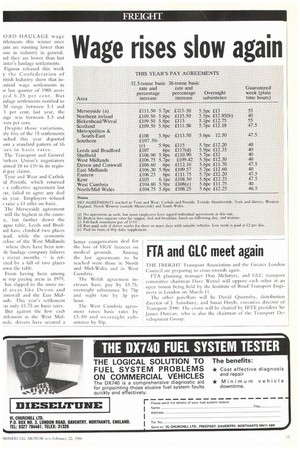Wage rises slow again
Page 13

If you've noticed an error in this article please click here to report it so we can fix it.
OAD HAULAGE wage ttlements this winter once ;ain are running lower than Lose in industry in general. nd they are lower than last inter's haulage settlements. Figures released this week y the Confederation of ritish Industry show that Mistrial wage settlements in ie last quarter of 1985 averged 6.25 per cent. But mlage settlements notified to 'M range between 5.1 and 1 per cent; last year, the Lnge was between 3.3 and 'yen per cent.
Despite those variations, tily five of the 15 settlements ached this year departed om a standard pattern of .0 Lses in basic rates.
The Transport and General Torkers Union's negotiators aimed 8:8 to 1:10 in its regioil pay claims.
Tyne and Wear and Carlisle id Penrith, which returned ■ a collective agreement last :.ar, failed to agree any deal Lis year. Employers refused raise a I:4 offer on basic. The Merseyside agreement still the highest in the couny, but further down the ague table. Leeds and Brad)rd have climbed two places lead, while the economic cline of the West Midlands where there have been not.ple haulage company failures recent months is refcted by a fall of two places own the table.
From having been among ie top paying areas in 1979, has slipped to the more rual areas like Devon and :ornwall and the East Midaids. This year's settlement as only 1:5.75 on basic rates. But against the low cash ,.ttlement in the West MidInds, drivers have secured a
better compensation deal for the loss of HGV licences on medical grounds. Among the last agreements to be reached were those in North and Mid-Wales and in West Cumbria.
The Welsh agreement increases basic pay by 1:5.75, overnight subsistence by 75p and night rate by 3p per hour.
The West Cumbria agreement raises basic rates by ):.5.80 and overnight subsistence by 50p.
























































